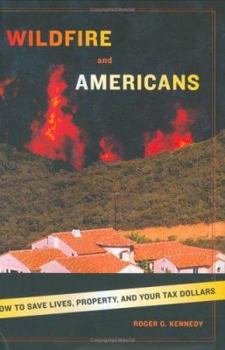Wildfire and Americans: How to Save Lives, Property, and Your Tax Dollars
Select Format
Select Condition 
Book Overview
Wildfire and Americans is a passionate, deeply informed appeal for us to acknowledge that wildfire is not a fire problem but a people problem. There are no natural disasters, only people in disastrous... This description may be from another edition of this product.
Format:Hardcover
Language:English
ISBN:0809065819
ISBN13:9780809065813
Release Date:June 2006
Publisher:Hill & Wang
Length:332 Pages
Weight:0.85 lbs.
Dimensions:1.1" x 6.7" x 9.2"
Customer Reviews
2 ratings
An important book every taxpayer should read
Published by Thriftbooks.com User , 18 years ago
The book is a real trailblazer on the subject of wildfire and its high costs in lives, property, and money. Kennedy frames his argument as an attempt to incite a "taxpayer revolt" on the subject, based on a long list of government policies, regulations, and subsidies encouraging people to build homes and businesses in areas with high risk of being destroyed by wildfires. He cites the interest deduction for home mortgages, mortgage insurance, publicly financed infrastructure supporting residential developments, roads, real property taxes, and the high cost of suppressing wildfires now exceeding $2 billion annually. He notes in particular the rebuilding of homes in fire-prone areas, sometimes on multiple occasions, paid for by insurance whose costs are borne by "the rest of us." Kennedy begins with the description of the May 2000 fire that began as a controlled burn at Bandelier National Monument. The National Park Service was wrongfully given much of the blame for a fire that ultimately burned some 18,000 acres, including 235 houses in Los Alamos, N.M. Los Alamos was a city of more than 12,000 people planned by scientists and engineers who gave every consideration to its security from spies, but none to the fact the city is "set in a firetrap." Kennedy notes that: "In the last half century about one-fifth of the American people have moved into flame zones," ill informed of the natural risks and encouraged by governmental and business policies. One of the author's principal recommendations involves the development of a National Flame Zone Atlas that "would show graduated degrees of danger, from low probability of big fires to high." Parts of such an Atlas exist now in disparate locations. An Atlas, revised regularly to reflect the dynamics of weather, vegetation, and population, could help reduce fire losses and steer public and private efforts to reduce flammable materials, such as the slash and debris from commercial logging and vegetation close to at-risk homes, businesses, and whole towns. He identifies a fire-industrial complex, similar to the military-industrial complex to which President Eisenhower referred in his farewell address that has a self-serving set of reasons to maintain the status quo. Fighting wildfire is very big business these days! That industry will (and does) lobby against reforms that could reduce fire losses through changes in regulations affecting insurance, infrastructure investments, roads and highways, and land use planning. Kennedy asserts that: "Not an acre of land has changed hands in the last half century without a part of the price being paid by another taxpayer."
Good Proposals for Reducing Wildfires!
Published by Thriftbooks.com User , 18 years ago
Thousands of people are moving unwarned into fire-prone areas every day - encouraged to do so by taxpayer subsidies (federally insured mortgages, roads, and insurance rates kept artificially low by regulators). Seven of the nine most fire-endangered states are also among those gaining the most in population. Meanwhile wildfires have doubled in frequency and in the size of areas burned. Meanwhile, Global Warning is likely to considerably expand the area of fire-prone forests. Kennedy's primary focus is the 2000 Los Alamos area fire that arose from a controlled burn that took off with unexpected winds, leading to about 450 burned houses and underserved scapegoating of the officials in charge. A second example is the 2002 Rodeo-Chediski fire in N.E. Arizona that burned 460,000 acres. Even before the fire was out, the state's Governor Hull and Senator Kyl were blaming it on "environmental wackos" that had blocked logging that would have removed much of the fire load. Reality, however, is that two-thirds of the fire took place within already heavily logged areas on the Apache Reservation, the environmental lawsuit only involved about 5% of the total area burned, a major reason the fire grew so large was delays in initially fighting it, as well as poor utilization of available volunteered privately-owned equipment, and that the Forest Service had already concluded that "timber harvest . . . has increased fire severity more than any other recent human activity." (Kennedy was its former director.) Furthermore, only 17% of wildfires have started on federal land. Kennedy recommends creating a "fire atlas" that would depict the fire danger in non-urban areas - it could be used by potential homeowners for more informed sitings, and by insurance agencies to more accurately reflect hazards.






